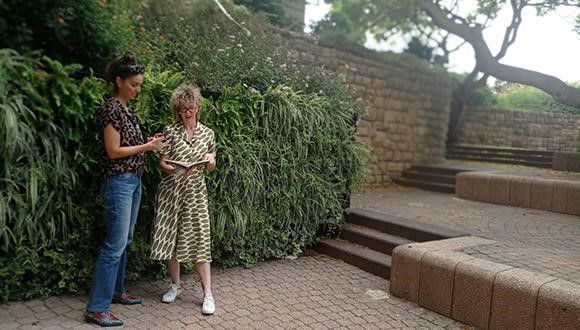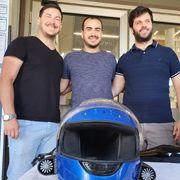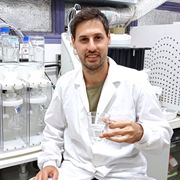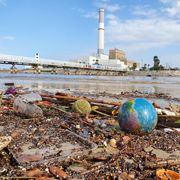See You at Naftali
Prof. Itai Sened explains how TAU students will tackle global warming from what will become the greenest building on campus
The Naftali building, which houses the Gershon H. Gordon Faculty of Social Sciences and was built in the 1960s, is one of the most iconic buildings on campus. And now, Prof. Itai Sened the Dean of the Faculty is planning to turn the building into a green island, attracting students from all faculties.
Imagine walls covered with photovoltaic cells (solar cells that convert solar energy to produce electricity), an open research lab on a roof top, and a green wall in the garden… The physical makeover of the building is only the tip of the iceberg: “This is the infrastructure of the program, and will serve as a focal point for research and development on the topic of climate change for the entire university, quietly contributing ideas and environmental solutions touching on all faculties,” says Prof. Sened.
A Lab that is not a Lab
What will it look like? The walls of the Matanel Garden on the ground floor are already covered with tropical vegetation that gives a sense of freedom and nature. In the garden, it will be possible to hold academic meetings on any subject, and there will be indoors work spaces with screens on the walls, displaying data on how much alternative energy the university produces on all roofs at any given moment. There will be a facility for landless agriculture, where the products will be monitored and tested by research teams. It will also provide raw materials for the cafeteria, which will make a comeback. The cafeteria will be operated by youth at risk, closely accompanied by students of social work and psychology.
The green wall and the agricultural garden will be irrigated with water extracted from the Tel Aviv air, which has been proven suitable for drinking, operated from the roof. An extension of the project, on the roof of the nearby Social Sciences Library, will include gray water purification laboratories, wind energy facilities and more. Solar panels will also cover the southern wall of the building.
The real focal point, however, is the lab. The 'Laboratory without a laboratory', as Prof. Sened calls it, will be run by Prof. Hadas Mamane, head of the Environmental Engineering Program at The Iby and Aladar Fleischman Faculty of Engineering, and Dr. Vered Blass from The Department of Environmental Studies, who specializes in circular economy. And where will it be? "The laboratory is located in the minds of students and researchers," explains Prof. Sened. "The spaces must be open; we cannot continue working with closed laboratories. We are building a unique program here that will take on anything that can be changed. Our goal is to train future leaders to deal with climate and water crises, to create a sustainable future.”
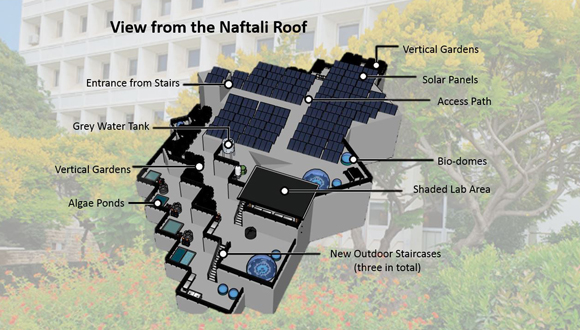
The future Naftali building, complete with vertical gardens, biodomes, solar panels, a shaded lab area, grey water tank and algae ponds.
Flow of Thought
The students in the novel program entailing a “lab-less lab” are master students, Israeli and international. "With us, they learn how to do special things in the most remote places in the world, but they need freedom. It's a new era. These are young people who grew up in a world without limits. There is no Faculty of Engineering, no Faculty of Law. There are young people who hang out, they are here and there and they keep returning, " Prof. Sened shares his reasons for setting up the special venture.
"Here you will see graduates of selected academic units who travel to the most remote villages in the world, together with someone from the Faculty of Life Sciences, someone from the School of Computer Science, students from the Faculty of Social Sciences – from Economics, Public Policy, Psychology and Anthropology. They go to those villages because that is what they enjoy doing and exploring. They will not sit here and write a doctorate for five years - that would be torture for them, as it does not suit them anymore. However, if we put them in this new type of lab, they will get a doctorate after they do much more. That is the guiding principle. "
An Entire Generation Looking for Purpose
Prof. Sened explains that while the whole thing may give off an “engineering and life sciences” vibe, most of the projects that are undertaken there are actually related to the social sciences. “One of our most talented doctoral students is about to start working at the State Comptroller’s Office as a real estate expert. Individuals like her wish to succeed and to change the legislation on all aspects of renewable energy. "
He explains that it is important for their students to know, right from the start, where they will be able to integrate when they complete their degree. "In these projects, they often integrate in the process. A student who goes to Kenya to purify water, install solar panels, or to study a worm that is making its name known in corn crops – may be noticed and ‘snatched" – and will already be on his way to another project. That’s how it works.”
“The infrastructure of what we are building here is 20% of the matter, and it is what is visible to the eye. However, the most interesting part is the remaining 80%, the minds involved. And they are not limited by space (...) We needed something visible, and so we built the green Naftali. Now they will finally be visible, " concludes Prof. Sened.
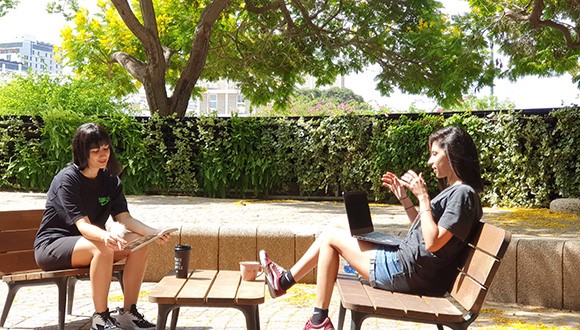
Students hanging out in the Naftali garden surrounded by its green walls


